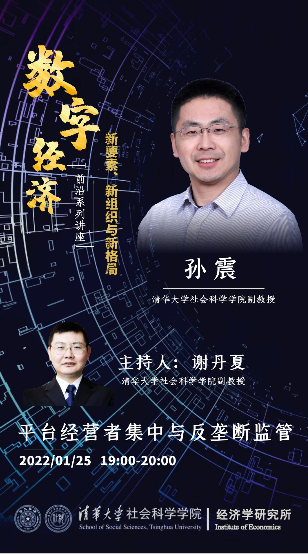
On January 25, Sun Zhen, associate professor at the Institute of Economics, School of Social Sciences, Tsinghua University, gave the Lecture 5 of Frontiers of Digital Economy Lecture Series, with the theme of platform operator concentration and anti-monopoly regulation. The lecture was presided over by Xie Danxia, assistant professor at the Institute of Economics, School of Social Sciences, Tsinghua University.
First of all, Prof. Sun reviewed the current situation and difficulties of anti-monopoly in China’s platform economy. He emphasized that the purpose of anti-monopoly is to encourage innovation and protect fair and full competition, not to impede enterprises to grow stronger, better, and larger. In this context, anti-monopoly should strike an important benefit-risk balance. In terms of static benefit-risk balance, monopoly can increase scale, reduce costs and improve efficiency, which may improve social welfare, but may also lead to the loss of user benefits. In terms of dynamic benefit-risk balance, the excess revenue brought by monopoly is an important driving force for enterprise innovation, but the “incumbent” monopolists have the ability and incentive to hinder further innovation. Furthermore, Prof. Sun summarized the difficulties of anti-monopoly in the field of platform economy: First, the presence of bilateral network externalities makes it possible for large platforms to be more efficient; second, how to define the relevant market; third, the use of data, flow, algorithms brings new problems in the definition of property rights, which makes monopolistic conduct more covert and regulatory costs higher.
Prof. Sun introduced his research on the economic analysis of the concentration of business operators in the platform market. Based on the market structure of oligopolistic competition in China’s platform market and the characteristics of competing for users’ attention, the original entrance is often retained after the merger of platforms. The merged platform faces two important strategic choices of whether to adjust its business positioning and whether to integrate the original market. Through modeling analysis, it is found that in order to maximize its own profits, the merged platform will maximize the differentiation among participating platforms to reduce their competition; however, the merged platform will not necessarily integrate the market. Users prefer the merged platform to integrate the market without changing the degree of business differentiation. In the case of low intensity of bilateral network externalities and small decrease of costs after merger, the optimal choices for the platform and users are just the opposite. The merger of platforms definitely means a drop in user benefits. Even if regulators require the merged platform to consolidate the market, user benefits will increase only in the case of high intensity of bilateral network externalities and large decrease of costs. In addition, the modeling demonstrated that when the platform fee for the merged platform is lower than that of platforms before the merger or that were not involved in the merger, user benefits after the merger must be greater than before the merger. The platform fee is an easily observable variable for regulatory authorities, which has practical reference significance for anti-monopoly regulation. Therefore, Prof. Sun concluded that in terms of platforms, if the merger cannot reduce cost, it is difficult to improve user benefits only by relying on the higher bilateral network externalities brought about by larger dataflow; in terms of regulation, when reviewing a merger application, regulatory authorities may require the platform to present the cost reduction or the estimated platform fee after the merger, and carry out regulation based on the above research findings.
Prof. Xie noted that the digital economy has become an important national policy of China; over the past year, anti-monopoly on platform economy has become an important topic. He emphasized that in the new economic form of the digital economy, a scientific and innovative research method should be adopted to ensure the healthy development of the economy.
This Lecture Series is supported by Sina Finance, NetEase Finance, Chinese Headlines, Xueshuo and KeAi’s Journal of Digital Economy.